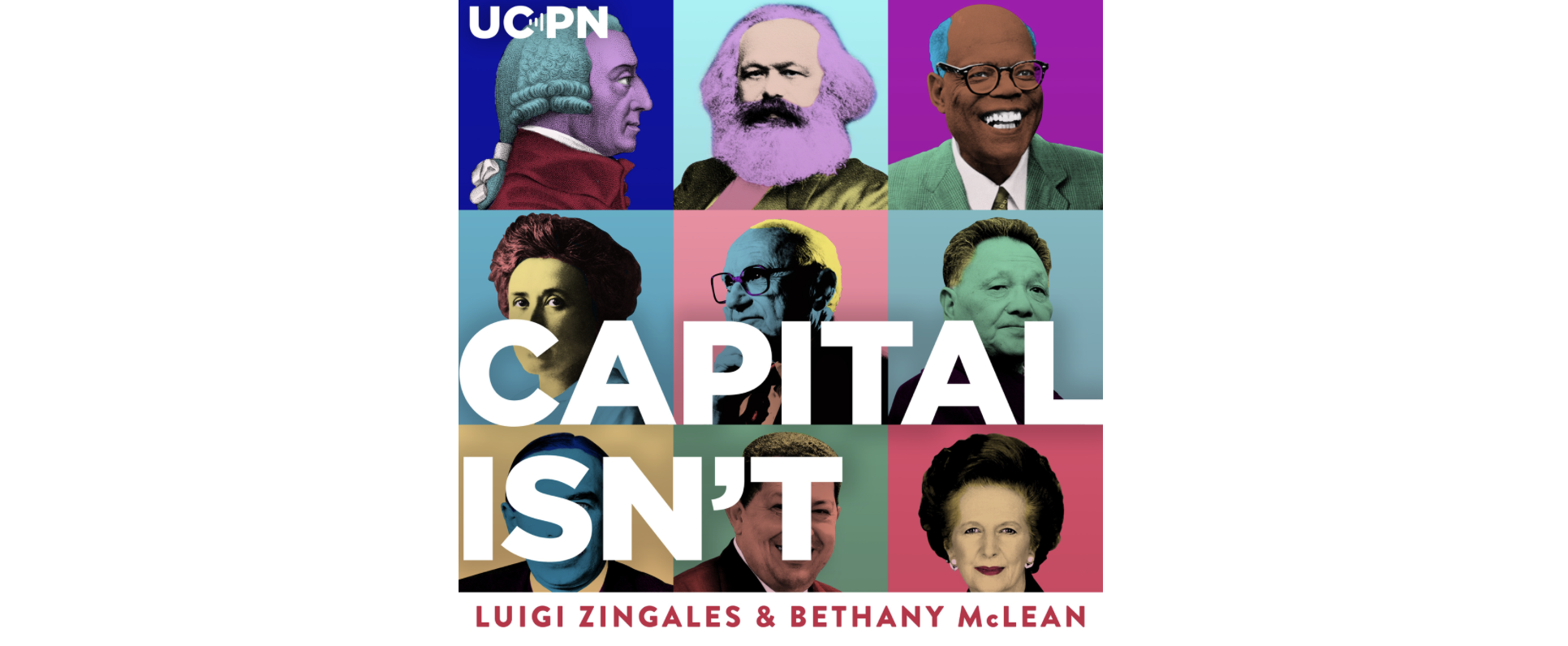

RECOMMENDED READING
A strange development of recent years has been the revival on parts of the left and the right of the long-dormant ideology of antimonopolism, once associated with agrarian populists like William Jennings Bryan and progressives like Louis Brandeis. Strange, because the antimonopoly school seeks to channel popular discontent with bipartisan neoliberalism, which puts too high a value on free markets, into support for a radical antitrust policy which…puts an even higher value on free markets than neoliberalism!
According to the antimonopoly school, the solution for most problems with capitalism is more capitalists. As they see it, free-market capitalism works just fine. The only problem is there are not enough companies. Having too few firms prevents Adam Smith’s invisible hand from working its miracles. Once Big Tech and Big Pharma and Big Hospital and Big Beer and Big Chicken and Big Cheerleader (yes, the new antitrusters worry about the cheerleading monopoly) are broken up, then market competition will automatically ensure that wages will rise, prices will fall and the voice of Mr. Smith, the tribune of the common people, will be heard in the halls of power in Washington once again.
This is not a caricature of the position of the new antimomonopolists. If you doubt me, read the material published by initiatives like the Roosevelt Institute’s Make Markets Be Markets and groups like the Open Markets Institute and the American Economic Liberties Project. The very names of their organizations attest to their commitment to a version of market fundamentalism.
“Panacea” is the fancy Greek word for “cure-all,” like the old patent medicines of the nineteenth century which promised to cure any number of real or imagined ailments. If the peddlers of the antitrust panacea are to be believed, a single miracle cure—breaking up big firms just because they are big—will help small producers, workers, and consumers, while empowering citizens of our democracy.
Small producers. The overwhelming majority of Americans are members of the working class without college degrees who work for wages and will never own a business, so the solicitude of politicians of both parties for the tiny minority of Americans who are small business owners seems excessive. But let us acknowledge that if you break up Big Hotel Chain you might help the family-owned Bates Motel in Fairvale, California.
A problem arises, however, if the antitrust cleaver is wielded in the shower against national and multinational corporations which are immense because of increasing returns to scale in manufacturing, like Boeing. Many small and medium-sized suppliers in the U.S. and elsewhere depend on Boeing as a customer. If you bust it up into five Baby Boeings, the same small suppliers might supply the successor firms. But if the successor firms collectively lose market share to Airbus, which has its own suppliers, these small Boeing suppliers may be out of business.
Firms that are huge because they benefit from network effects present different challenges to the antitrusters. As Robert D. Atkinson and I pointed out in our book Big is Beautiful, a court decree that Facebook be divided into Facebook and Headbook is unlikely to lead to an explosion of mom-and-pop social media startups. On the contrary, if all of your friends and relatives are already on Facebook, why would you move to Headbook, much less a startup social media platform with hardly any users?
Workers. Few relationships are better documented in contemporary social science than the inverse relationship between unionization and wage inequality in the United States. For the past several years, ignoring the rise and fall of organized labor, some members of the antimonopoly school have blamed wage stagnation or decline for many Americans on increased industry concentration in the U.S. The argument is that the monopsony (buying) power of big firms has lowered the ability of individual workers to bargain with firms for higher wages.
The problem with this theory is that sectors like automobiles and steel were more concentrated in the 1950s in the U.S. than they were in the 1920s. And yet workers in the 1950s were paid better and had benefits and voice in their companies at the later date. Why? Unions! Collective bargaining between employers and unions existed in the 1950s but had been absent in the 1920s.
Furthermore, the idea that, if we break up Google or Facebook into two or five or a dozen companies with less monopsony power, non-union janitors as solitary individuals will be empowered to play the successor companies against one another to bid up janitor wages is preposterous.
Consumers. In the dogmatic theology of antimonopolism, all big firms are sinister “monopolies” intent on predatory pricing. But in the case of manufacturing and tech, prices have constantly fallen for decades, so that even low-income people can own computers or iPhones or cars with computing power that large companies and governments did not possess a generation ago.
In cases where price-gouging is real—much of the U.S. medical sector, for example, or some local grocery stores in poor neighborhoods—multiplying the number of hospitals or grocery stores, in the hope that the magic of Mr. Market will bring down prices, is unlikely to succeed, making remedies other than antitrust necessary.
Citizens. When their other arguments have been refuted, antimonopolists often wrap themselves in Old Glory and claim that American democracy depends on self-sufficient, economically-independent citizens who own their own small farms or businesses. If that is your quaint Jeffersonian definition of democracy, then you must conclude that democracy vanished in the U.S. more than a century ago, thanks to industrialization and urbanization. A society with a majority of independent smallholders who belong to the local militia will never return, absent a total collapse of technological civilization and a reversion to agrarianism. For the foreseeable future, the majority of Americans are and will remain proletarians—that is, wage earners who sell their labor to employers (private, public, or nonprofit) in return for income and, in some cases, benefits.
What about the corruption of government by lobbying? Small businesses lobby through trade associations, just as many large firms do. Once you break up Big Chicken into a dozen Baby Chicks, what is to prevent the Baby Chicks from forming a trade association to spend money on politicians who do favors for the chicken industry? If you want to ban lobbying, ban lobbying—by small businesses and trade associations as well as big ones.
Moreover, antitrust does nothing to alter the American class system. A small number of people and institutions own a disproportionate amount of shares in publicly traded U.S. corporations. As Matt Bruenig pointed out recently, if you split up big firms, the people who own their shares are likely to buy shares of the new, spun-off firms as well. By persuading the Justice Department to break up Facebook, have you struck a blow for the working class against the managerial capitalist overclass? No. You’ve merely created a few more jobs for affluent CEOs, managers, and HR staff in the successor social media firms, and maybe windfalls for a few investors, without significantly changing the distribution of income and wealth in the U.S.
The censorship by Twitter, Google, Facebook, and other social media platforms of conservative and dissident left viewpoints in favor of the party line of the corporate neoliberal wing of the Democratic party is well-documented. But here again, antitrust is the wrong remedy. Multiplying the number of social media platforms will not increase viewpoint diversity, if all of the new platforms are staffed by the same intolerant “woke” progressives from the same narrow social stratum. The only way to preserve viewpoint diversity in social media and legacy media is for the government to mandate it directly, by means of regulation and legislation.
The alternative to the phony miracle drug of antitrust is the tested and proven remedy of countervailing power. The term was coined by the economist John Kenneth Galbraith, but the practice is much older.
The idea of countervailing power is simple. If you have concentrated power in one part of the economy, you can either use the crude instrument of antitrust to pulverize it, or you can balance that concentration of power with another concentration of power. The government itself can wield countervailing power, checking unbalanced corporate power directly by means of regulation. But countervailing power can also be exercised by non-governmental entities that pool the power of many smaller entities or great numbers of individuals—entities that include labor unions, purchasing cooperatives, and credit unions.
Let’s look at how countervailing power can promote the interests of the four groups we have already discussed: small producers, workers, consumers, and citizens.
Small producers. What if, instead of levelling down, we levelled up? What if, instead of tearing down big firms, we allowed small firms to pool their efforts, to enjoy economies of scale by working together in marketing, research, or other areas? The Supreme Court has ruled that small-producer cartels are illegal under U.S. antitrust laws, but most mergers of small firms to form a single large firm are legal.
There are exceptions to this rule. One is the Capper-Volstead Act of 1922, which exempts certain agricultural cooperatives from antitrust prosecution. Today, the majority of American farmers belong to one or more of the 2000 local farm cooperatives under the umbrella of the National Council of Farmer Cooperatives (NCFC), founded in 1929.
In addition to these traditional cooperatives, legislation in 2014 authorized the creation of commodity marketing boards under the U.S. Department of Agriculture which are funded by mandatory assessments on producers of a given commodity and use the funds for research and marketing, including export promotion. Among these are the wonderfully-named Popcorn Board, Christmas Tree Board, Mushroom Council, and Administrative Committee for Pistachios. Similar government-chartered research and marketing boards could be created on behalf of small to medium firms in other sectors like manufacturing and services.
But here’s the irony: marketing cooperatives for small producers work because they are exempt from antitrust law. The antimonopolists seek to help small firms indirectly, by breaking up big firms. The real friends of small business for nearly a century have chosen the wiser strategy of helping small firms directly, by carving out exemptions from antitrust law to allow small businesses to combine for certain shared purposes so they can compete with big firms.
Workers. The most important kind of countervailing power in a modern industrial society is provided by organized labor. The American labor movement has usually sought to get large firms to share their profits with their workers, not break them up. Samuel Gompers, the founding president of the American Federation of Labor (AFL), in a 1907 speech entitled “Labor and Its Attitude Toward the Trusts,” declared of modern large corporations:
With their advent and development the day of individual workman and individual employer passed, never to return…Organized labor has less difficulty in dealing with large firms and corporations today than with many individual employers or small firms.
Consumers. It is possible, to be sure, that some firms will use monopoly or oligopoly market power to gouge consumers or small businesses. One remedy short of direct government regulation is to encourage the formation of consumer purchasing cooperatives, which can pool the buying power of their members, whether individuals or firms, in order to bargain for discounts. Variations of countervailing power on the side of consumers include member-owned grocery stores and member-owned credit unions.
Citizens. When all other forms of countervailing power have been tried and have failed to check predatory pricing of goods, services, lending or wages, government can step in and regulate prices or wages directly on behalf of the citizenry. In health care, for example, every advanced nation except the U.S. negotiates standard “all-payer” fee schedules with physicians’ associations, hospital associations and pharma companies. Public utility grids are natural geographic monopolies, so local governments regulate the rates they can charge, even if they are privately owned. The federal minimum wage provides a floor for wages.
But direct regulation of prices or wages by government should be the last resort. While the crude version of academic Econ 101 found in the brains of most policymakers and pundits holds that prices and wages can be set only by market competition or government, in the real world prices and wages are often set by a third method: negotiation among buyers and sellers.
If markets are uncompetitive, or if they are competitive but produce outcomes that are intolerable for society, then before resorting to coercive regulation government should first encourage or establish institutions with countervailing power—small-producer coops that can compete with big firms in sectors characterized by economies of scale, trade unions that can bargain for higher wages and benefits from employers, consumer cooperatives that can bargain down the prices charged by vendors to their members, and credit unions that can offer their members low-cost alternatives to commercial banking products.
In an economy based on the checks and balances of countervailing power, there will still be room for antitrust/competition policy at the margins. But the focus of antitrust policy should be on actual predatory behavior, not scale by itself. And while synergies make sense in some sectors, there is no economic justification for conglomerate firms that exist solely to siphon revenues from incoherent assemblages of companies in unrelated industries.
Countervailing power, yes; antitrust, maybe. Rather than dismember the giants, government as a rule should help the Lilliputians to join forces.
Recommended Reading
Is Common Good Capitalism the Answer?
American Compass executive director Oren Cass joins Luigi Zingales and Bethany McLean to discuss common good capitalism, China’s relationship with the U.S., Big Labor, and more.
Musings on Neoliberalism
Some time after I first met Oren, we had a good back and forth about neoliberalism, a term that has already appeared several times on this website and is at the forefront of American Compass’s mind. While Oren thought the word useful to describe the reigning economic orthodoxy we both found dissatisfying, I was more reticent to use it.
Justice Thomas, Countervailing Power, and Big Tech
Justice Thomas has entered a hot debate about the best means of regulating social media. His approach to regulation tends to be more function-centric as opposed size-centric.












